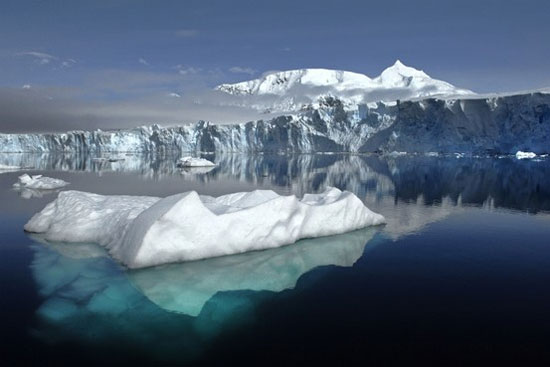Arctic melting ice could cause $ 60,000 billion in damage
The phenomenon of melting ice to release methane in the Arctic could accelerate the pace of climate change and cause damage to up to $ 60,000 billion for the global economy. This is a warning of a study published in Nature newspaper 24/7.
The Dutch and Erasmus universities of the Netherlands used an economic model to calculate the extent of specific damage in the case of permafrost under the East Siberian Sea, the waters of the Arctic Ocean, and dissipated. flowing and releasing 50 gigatonne of methane gas, provided that global temperatures maintain current growth rates.
Without climate change mitigation measures, the above release of methane could cost up to $ 60,000 billion to the global economy, according to researcher Chris Hope. This huge number is approximately equal to the total value of the world economy achieved last year was 70,000 billion USD.

Photo: online.wsj.com
About 80% of the damage will be dumped on developing countries, which will have to deal with extreme weather patterns such as floods, droughts as well as declining public health.
The study warns that the number of damages could be greater if other factors such as ocean acidification were taken into account, but could also be reduced, to about $ 37,000 billion, if governments promptly responded. with climate change.
Methane in the atmosphere is a greenhouse gas. In a high pressure environment on the ocean floor, methane creates a solid sieve with water, called methane hydrate.
If the Earth heats up to a certain temperature, this entire amount of methane could once again be released suddenly into the atmosphere, amplifying the greenhouse effect many times and warming the Earth to an unprecedented level of heat. see.
According to the study, the phenomenon, if it happens, will push the average temperature of the Earth to rise above the threshold of 2 degrees C earlier, in the next 15-35 years.
Previously, scientists have warned the global average temperature increase should keep below 2 degrees C to prevent dangerous effects such as crop failure and thawing.
- It sounds crazy, but this hundred billion dollar project could save the Earth
- Every second 14,000 tons of water flows into the sea because the Arctic ice melts
- Arctic ice is melting record fast
- Discover the ancient village of Eskimo under the ice melting in the Arctic
- Beautiful scenery is unique in the North Pole
- The Arctic ice melted four times faster than forecast
- Warming in the Arctic will affect Vietnam
- The Arctic emits 62 billion tons of carbon in the 21st century
- For the first time in 100,000 years, the Arctic ice can melt completely
- America takes advantage of Arctic ice to track submarines
- What's going on with the Earth's 'refrigerator'?
- The real cause of ice melting in the North Pole?
 Is the magnetic North Pole shift dangerous to humanity?
Is the magnetic North Pole shift dangerous to humanity? Washington legalizes the recycling of human bodies into fertilizer
Washington legalizes the recycling of human bodies into fertilizer Lightning stone - the mysterious guest
Lightning stone - the mysterious guest Stunned by the mysterious sunset, strange appearance
Stunned by the mysterious sunset, strange appearance